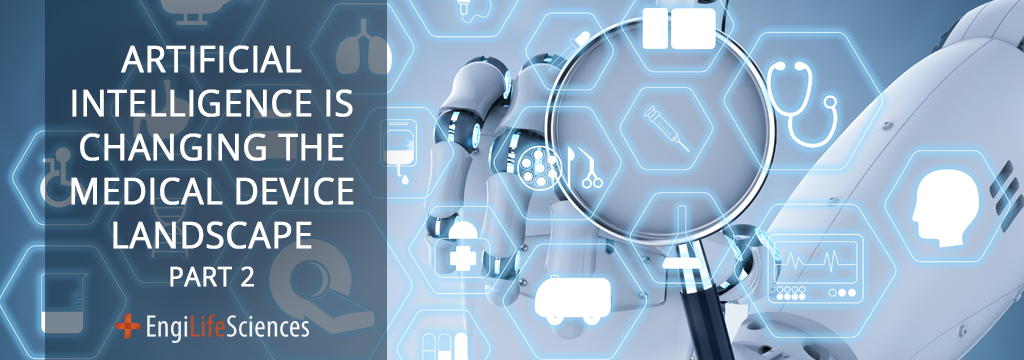Artificial Intelligence (AI) has a multitude of applications within the medical field and in particular, with medical devices. As the purpose of AI in any field is to augment human aptitudes and experiences, the expanded capabilities provided in the medical field are vast. Four areas seeing expansion of AI are in management of chronic diseases, surgical robotics, medical imaging, and the partnership between AI and Internet of Things (IoT).
In the management of chronic diseases, often the physician or other healthcare professional sees merely a snapshot of the patient’s health profile. AI provides a way to continually compile data through wearable devices, portable medical devices, and other monitoring technologies. That data can then be analyzed and translated into information that a patient can use. In some current applications, AI is able to predict potential problems and provide a solution.
AI combined with machine learning is being explored in the surgical field for purposes such as automation of suturing, evaluation of surgical skills, improvement of surgical robotic materials and surgical workflow modeling. Although these are not all being used currently in real world application, they are continually being tested and developed to improve the surgical landscape.1
Medical imaging requires the assessment of large amounts of data to determine an accurate diagnosis. Algorithms are created to recognize anomalies that could otherwise be missed by the human eye. This more detailed processing supports a quicker, more accurate result.2
Combining AI with IoT expands the possibilities of medical devices. IoT allows the data collected from wearable gadgets or portable devices to be collected and analyzed remotely. Merging this collected information with other relevant databases provides a more comprehensive view.3
With all the potential applications of AI in the medical device field, compliance with regulatory policies and processes is vital. Read more about how AI is stimulating change in regulatory environment in Part 1.
(1) Machine Learning in Surgical Robotics. www.techemergence.com. Retrieved 2018-04-15
(2) AI Medical Devices. www.techemergence.com. Retrieved 2018-04-15
(3) The Impact of Artificial Intelligence. www.mpo-mag.com. Retrieved 2018-04-15

